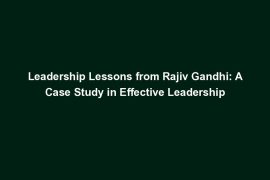Hey there, history buffs and aspiring leaders! Today, we’re diving into the fascinating world of leadership with a closer look at one of India’s most iconic figures – Indira Gandhi.
Indira Gandhi was not just the first female Prime Minister of India, but also a trailblazer in her own right. Her fearless approach in the face of adversity, coupled with her strong communication skills and strategic vision, made her a force to be reckoned with.
In this blog post, we’ll explore the inspiring traits and strategies that made Indira Gandhi such an effective leader. From her ability to connect with the masses to her resilience in the face of setbacks, there’s plenty to learn from her remarkable journey.
So, buckle up and get ready to uncover the valuable leadership lessons that Indira Gandhi has to offer. By the end of this post, you’ll be equipped with insights to help you navigate your own leadership journey with confidence. Let’s dive in!
Inspiring Traits of Indira Gandhi
Indira Gandhi was a force to be reckoned with, known for her fearless and determined nature. In the face of adversity, she stood her ground and never backed down. Whether it was dealing with political opponents or navigating turbulent times in India’s history, Gandhi showed unwavering determination that inspired many.
Fearlessness and Determination
Imagine facing constant challenges and criticisms from all sides, yet having the courage to stand tall and fight for what you believe in. That was Indira Gandhi in a nutshell. Her fearlessness in the face of adversity is a trait that aspiring leaders can learn from. It takes guts to push forward when the odds are stacked against you, but Gandhi showed that with determination and perseverance, anything is possible.
Strong Communication Skills
One of Gandhi’s key strengths was her ability to connect with the masses through strong communication skills. She could capture the attention of a crowd with her words and make them feel heard and understood. Being able to effectively convey your message to others is crucial for any leader, and Gandhi’s prowess in this area was unmatched.
Strategic Vision and Tough Decision Making
Gandhi was a visionary leader who could see the bigger picture and make tough decisions for the greater good. She wasn’t afraid to make unpopular choices if she believed they were the right ones. This ability to balance long-term strategic vision with short-term challenges is a valuable trait for leaders in any field.
Empathy and Compassion
Despite her strong-willed nature, Gandhi also had a compassionate side. She showed empathy towards marginalized communities and worked towards upliftment and empowerment. This combination of strength and compassion is what made her a beloved leader in the eyes of many.
Resilience
Lastly, Gandhi’s resilience in the face of setbacks is a lesson worth remembering. She faced numerous challenges and obstacles throughout her career, but she never gave up. Instead, she bounced back stronger each time, showcasing the importance of grit and determination in achieving success.
Strategies Employed by Indira Gandhi
Now that we’ve discussed the inspiring traits that defined Indira Gandhi’s leadership style, let’s dive into the various strategies she employed to navigate the complex world of politics and governance. These strategies were instrumental in helping her leave a lasting impact on the country and the world.
Building a strong team of advisors and collaborators
Indira Gandhi understood the importance of surrounding herself with a diverse group of advisors who could provide valuable insights and perspectives. By leveraging the expertise of her team, she was able to make well-informed decisions that would benefit the nation as a whole. Building a strong support system is crucial for any leader looking to navigate challenges and seize opportunities effectively.
Leveraging personal relationships and networking for political gain
Indira Gandhi was known for her ability to forge strong personal relationships with political leaders both domestically and internationally. These relationships often played a key role in shaping her policies and decisions. Networking and fostering connections with influential individuals can open doors and create new opportunities for leaders to make a positive impact.
Embracing change and adapting to evolving political landscapes
One of the key reasons for Indira Gandhi’s success as a leader was her ability to adapt to changing political environments. She demonstrated a keen sense of awareness and flexibility, which allowed her to navigate turbulent times with grace and resilience. Leaders must be willing to embrace change and continuously evolve their strategies to remain relevant and effective.
Utilizing media and communication platforms to garner public support
Indira Gandhi understood the power of effective communication in shaping public opinion and garnering support for her initiatives. She was able to effectively leverage media platforms to convey her message and connect with the masses. In today’s digital age, leaders must harness the power of social media and other communication tools to engage with their audience and build a strong following.
Balancing diplomacy with firm leadership in international relations
Indira Gandhi was known for her diplomatic prowess and firm stance on international issues. She was able to strike a delicate balance between diplomacy and assertiveness, which earned her respect on the global stage. Leaders must prioritize diplomacy while also demonstrating strength and resolve in their interactions with other nations to uphold their country’s interests.
By studying the strategies employed by Indira Gandhi, aspiring leaders can gain valuable insights into the complexities of leadership and governance. These lessons are timeless and can be applied in modern contexts to overcome challenges and achieve success in various fields. As you reflect on Gandhi’s leadership journey, consider how you can incorporate some of her strategies into your own practices to become a more effective and influential leader.



